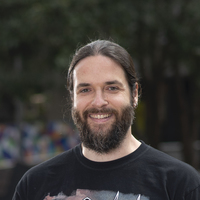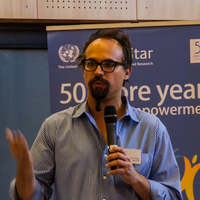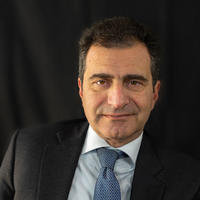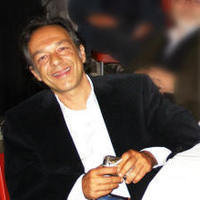
Ioanna Theocharopoulou
Ioanna Theocharopoulou is an architect and architectural historian whose research focuses on cities and on the histories, theories and evolving concepts of post-carbon architecture and society. She trained at the Architectural Association in London (AA Diploma), and holds a Master’s degree in Advanced Architectural Design (MSAAD), and a Ph.D. in Architectural History from Columbia University. She is the author of Builders, Housewives and the Construction of Modern Athens, (London: Artifice, 2017, and Athens: The Onassis Foundation, 2022). Theocharopoulou has presented in and has collaborated in organizing numerous academic conferences. Her writing has appeared in journals including Log, Thresholds, the RIBA journal, and has contributed chapters in several architectural history and theory books. She has taught at Columbia University, Cornell University, Parsons / New School, and the Cooper-Hewitt National Design Museum Smithsonian Institution.
Central to her methodology is an interdisciplinary approach that bridges architectural history with environmental studies, urban planning and anthropology. By focusing on the relationship between the materiality of buildings and the spatial practices of their inhabitants, she explores how built forms embody cultural values, social hierarchies and ecological constraints. Between 2018-2021, Theocharopoulou collaborated with two documentary filmmakers, Tassos Langis and Yiannis Gaitanidis, and with the Onassis Foundation, to translate her scholarly work into a visually compelling cinematic narrative that brought the overlooked histories of Athens to broader audiences (see the documentary trailer here: https://www.youtube.com/watch?v=-e7bavNz2tA). The eponymous documentary has been shown widely in festivals around the world, including in New York's Architecture and Design Film Festival, and has won the Best Film Award at Cinema Urbana – Architecture Film Festival Brasilia in Brazil, in August 2022.
Expanding on her work on Athens, Theocharopoulou now focuses on comparative histories that aim to enrich and challenge the rigid dichotomies often drawn between West and East, as well as North and South in architectural narratives. Her next book highlights underrepresented narratives in the histories of the Eastern Mediterranean, through the work of Constantinos A. Doxiadis (1913-1975) and his colleagues and associates, during the decade of the 1950s and early 1960s.
Central to her methodology is an interdisciplinary approach that bridges architectural history with environmental studies, urban planning and anthropology. By focusing on the relationship between the materiality of buildings and the spatial practices of their inhabitants, she explores how built forms embody cultural values, social hierarchies and ecological constraints. Between 2018-2021, Theocharopoulou collaborated with two documentary filmmakers, Tassos Langis and Yiannis Gaitanidis, and with the Onassis Foundation, to translate her scholarly work into a visually compelling cinematic narrative that brought the overlooked histories of Athens to broader audiences (see the documentary trailer here: https://www.youtube.com/watch?v=-e7bavNz2tA). The eponymous documentary has been shown widely in festivals around the world, including in New York's Architecture and Design Film Festival, and has won the Best Film Award at Cinema Urbana – Architecture Film Festival Brasilia in Brazil, in August 2022.
Expanding on her work on Athens, Theocharopoulou now focuses on comparative histories that aim to enrich and challenge the rigid dichotomies often drawn between West and East, as well as North and South in architectural narratives. Her next book highlights underrepresented narratives in the histories of the Eastern Mediterranean, through the work of Constantinos A. Doxiadis (1913-1975) and his colleagues and associates, during the decade of the 1950s and early 1960s.
less
Related Authors
C. Michael Hall
University of Canterbury/Te Whare Wānanga o Waitaha
David Seamon
Kansas State University
Armando Marques-Guedes
UNL - New University of Lisbon
Scott Cohen
University of Algarve
Simon Springer
The University of Newcastle
Kyle Whyte
University of Michigan
Nicola Lupo
LUISS Guido Carli
Dimitris P. Drakoulis
Aristotle University of Thessaloniki
Joni Adamson
Arizona State University
Emanuele Greco
Università Degli Studi di Napoli "L'Orientale"
InterestsView All (10)










Uploads
Papers by Ioanna Theocharopoulou
The book served as the inspiration for the 2021 documentary film of the same name, written and directed by Giannis Gaitanidis and Tassos Langis.
This interview has been edited for clarity and length. The views presented by the interview subject are the opinions of the subject and do not represent the views of the author or this newsletter. Browse the full interview archive here.
"Ανοιχτες πολεις. Εναλλακτικες προτασεις για μια πολη ανθρωπινη και φιλικη"
[Open Cities. Alternative Proposals for a More Humane and Friendly City]
Edited by Memos Philippidis, architect and author.
Conference Presentations by Ioanna Theocharopoulou
Simon Critchley, Hans Jonas Professor of Philosophy, The New School for Social Research
Nader Vossoughian, Associate Professor of Architecture, NYIT
Neni Panourgiá, Adjunct Associate Professor, The Prison Education Program, Psychology Department; Academic Adviser, The Justice in Education Initiative, Columbia University
Ioanna Theocharopoulou, Visiting Lecturer, Department of Architecture, Art and Planning, Cornell University; Author, Builders, Housewives and the Construction of Modern Athens
The transcripts of the Circle of Scientists meetings were recorded in a journal, Chorotaxìa (from choros = space and taxi = order), a single copy of which exists in the Doxiadis Archive in Athens, dating from 1942. The work of the “scientific” resistance movement was elaborated into a recently re-discovered, large-format catalogue, Sacrifices of Greece During the Second World War, published immediately after the end of the war. Transcribing war-time losses, Sacrifices of Greece gave further incentive to classify and enumerate: no longer just about cultural artifacts but also about olives, wheat, goats, donkeys, mules and starving children, this time the numbers and data also turned into sophisticated visual information. Doxiadis’s life-long mission of preserving and classifying facts, developed during a period of wartime resistance, endowed his work with a special urgency. As a high-ranking government employee during the decade of the 1940s, we sense that he felt personally responsible to protect and organize the totality of knowledge about his country. Compounded by the lack of access to the war-time material until very recently, and by the political and personal antagonism felt towards Doxiadis, accentuated during the Civil War (1946-49) and again during the early 1970s, this early period of intense and prolific architectural activity has been largely misunderstood and all but forgotten.
The book served as the inspiration for the 2021 documentary film of the same name, written and directed by Giannis Gaitanidis and Tassos Langis.
This interview has been edited for clarity and length. The views presented by the interview subject are the opinions of the subject and do not represent the views of the author or this newsletter. Browse the full interview archive here.
"Ανοιχτες πολεις. Εναλλακτικες προτασεις για μια πολη ανθρωπινη και φιλικη"
[Open Cities. Alternative Proposals for a More Humane and Friendly City]
Edited by Memos Philippidis, architect and author.
Simon Critchley, Hans Jonas Professor of Philosophy, The New School for Social Research
Nader Vossoughian, Associate Professor of Architecture, NYIT
Neni Panourgiá, Adjunct Associate Professor, The Prison Education Program, Psychology Department; Academic Adviser, The Justice in Education Initiative, Columbia University
Ioanna Theocharopoulou, Visiting Lecturer, Department of Architecture, Art and Planning, Cornell University; Author, Builders, Housewives and the Construction of Modern Athens
The transcripts of the Circle of Scientists meetings were recorded in a journal, Chorotaxìa (from choros = space and taxi = order), a single copy of which exists in the Doxiadis Archive in Athens, dating from 1942. The work of the “scientific” resistance movement was elaborated into a recently re-discovered, large-format catalogue, Sacrifices of Greece During the Second World War, published immediately after the end of the war. Transcribing war-time losses, Sacrifices of Greece gave further incentive to classify and enumerate: no longer just about cultural artifacts but also about olives, wheat, goats, donkeys, mules and starving children, this time the numbers and data also turned into sophisticated visual information. Doxiadis’s life-long mission of preserving and classifying facts, developed during a period of wartime resistance, endowed his work with a special urgency. As a high-ranking government employee during the decade of the 1940s, we sense that he felt personally responsible to protect and organize the totality of knowledge about his country. Compounded by the lack of access to the war-time material until very recently, and by the political and personal antagonism felt towards Doxiadis, accentuated during the Civil War (1946-49) and again during the early 1970s, this early period of intense and prolific architectural activity has been largely misunderstood and all but forgotten.